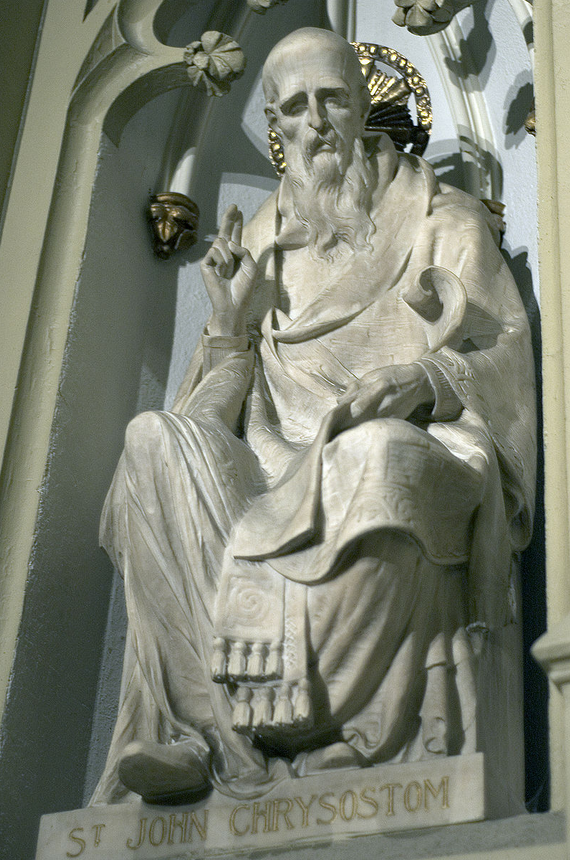
Editor’s note: The following is extracted from Beacon Lights of History, Volume IV: Imperial Antiquity, by John Lord (published 1888). All spelling in the original.
There are few incidents in his troubled age more impressive than when this great preacher sheltered Antioch from the vengeance of Theodosius. That thoughtless and turbulent city had been disgraced by an outrageous insult to the emperor. A mob, a very common thing in that age, had rebelled against the majesty of the law, and murdered the officers of the Government. The anger of Theodosius knew no bounds, but was fortunately averted by the entreaties of the bishop, and the emperor abstained from inflicting on the guilty city the punishment he afterwards sent upon Thessalonica for a less crime. Moreover the repentance of the people was open and profound. Chrysostom had moved and melted them. It was the season of Lent. Every day the vast church was crowded. The shops were closed; the Forum was deserted; the theatre was shut; the entire day was consumed with public prayers; all pleasures were forsaken; fear and anguish sat on every countenance, as in a Mediaeval city after an excommunication. Chrysostom improved the occasion; and perhaps the most remarkable Lenten sermons ever preached, subdued the fierce spirits of the city, and Antioch was saved. It was certainly a sublime spectacle to see a simple priest, unclothed even with episcopal functions, surrounded for weeks by the entire population of a great city, ready to obey his word, and looking to him alone as their deliverer from temporal calamities, as well as their guide in fleeing from the wrath to come.
And here we have a noted example of the power as well as the dignity of the pulpit,–a power which never passed away even in ages of superstition, never disdained by abbots or prelates or popes in the plenitude of their secular magnificence (as we know from the sermons of Gregory and Bernard); a sacred force even in the hands of monks, as when Savonarola ruled the city of Florence, and Bourdaloue awed the court of France; but a still greater force among the Reformers, like Luther and Knox and Latimer, yea in all the crises and changes of both the Catholic and Protestant churches; and not to be disdained even in our utilitarian times, when from more than two hundred thousand pulpits in various countries of Christendom, every Sunday, there go forth voices, weak or strong, from gifted or from shallow men, urging upon the people their duties, and presenting to them the hopes of the life to come. Oh, what a power is this! How few realize its greatness, as a whole! What a power it is, even in its weaker forms, when the clergy abdicate their prerogatives and turn themselves into lecturers, or bury themselves in liturgies! But when they preach without egotism or vanity, scorning sensationalism and vulgarity and cant, and falling back on the great truths which save the world, then sacredness is added to dignity. And especially when the preacher is fearless and earnest, declaring most momentous truths, and to people who respond in their hearts to those truths, who are filled with the same enthusiasm as he is himself, and who catch eagerly his words of life, and follow his directions as if he were indeed a messenger of Jehovah,–then I know of no moral power which can be compared with the pulpit. Worldly men talk of the power of the press, and it is indeed an influence not to be disdained,–it is a great leaven; but the teachings of its writers, when not superficial, are contradictory, and are often mere echoes of public sentiment in reference to mere passing movements and fashions and politics and spoils. But the declarations of the clergy, for the most part, are all in unison, in all the various churches–Catholic and Protestant, Episcopalian, Presbyterian, Methodist and Baptist–which accept God Almighty as the moral governor of the universe, the great master of our destinies, whose eternal voice speaketh to the conscience of mankind. And hence their teachings, if they are true to their calling, have reference to interests and duties and aspirations and hopes as far removed in importance from mere temporal matters as the heaven is higher than the earth. Oh, what high treason to the deity whom the preacher invokes, what stupidity, what frivolity, what insincerity, what incapacity of realizing what is truly great, when he descends from the lofty themes of salvation and moral accountability, to dwell on the platitudes of aesthetic culture, the beauties and glories of Nature, or the wonders of a material civilization, and then with not half the force of those books and periodicals which are scattered in every hamlet of civilized Europe and America!
Now it was to the glory of Chrysostom that he felt the dignity of his calling and aspired to nothing higher, satisfied with his great vocation,–a vocation which can never be measured by the lustre of a church or the wealth of a congregation. Gregory Nazianzen, whether preaching in his paternal village or in the cathedral of Constantinople, was equally the creator of those opinion-makers who settle the verdicts of men. Augustine, in a little African town, wielded ten times the influence of a bishop of Rome, and his sermons to the people of the town of Hippo furnished a thesaurus of divinity to the clergy for a thousand years.
Nevertheless, Antioch was not great enough to hold such a preacher as Chrysostom. He was summoned by imperial authority to the capital of the Eastern Empire. One of the ministers of Arcadius, the son of the great Theodosius, had heard him preach, and greatly admired his eloquence, and perhaps craved the excitement of his discourses,–as the people of Rome hankered after the eloquence of Cicero when he was sent into exile. Chrysostom reluctantly resigned his post in a provincial city to become the Patriarch of Constantinople. It was a great change in his outward dignity. His situation as the highest prelate of the East was rarely conferred except on the favorites of emperors, as the episcopal sees of Mediaeval Europe were rarely given to men but of noble birth. Yet being forced, as it were, to accept what he did not seek or perhaps desire, he resolved to be true to himself and his master. Scarcely was he consecrated by Theophilus of Alexandria before he launched out his indignant invectives against the patron who had elevated him, the court which admired him, and the imperial family which sustained him. Still the preacher, when raised to the government of the Eastern church, regarding his sphere in the pulpit as the loftiest which mortal genius could fill. He feared no one, and he spared no one. None could rob a man who had parted with a princely fortune for the sake of Christ; none could bribe a man who had no favors to ask, and who could live on a crust of bread; none could silence a man who felt himself to be the minister of divine Omnipotence, and who scattered before his altar the dust of worldly grandeur.
It seems that Chrysostom regarded his first duty, even as the Metropolitan of the East, to preach the gospel. He subordinated the bishop to the preacher. True, he was the almoner of his church and the director of its revenues; but he felt that the church of Christ had a higher vocation for a bishop to fill than to be a good business man. Amid all the distractions of his great office he preached as often and as fervently as he did at Antioch. Though possessed of enormous revenues, he curtailed the expenses of his household, and surrounded himself with the pious and the learned. He lived retired within his palace; he dined alone on simple food, and always at home. The great were displeased that he would not honor with his presence their sumptuous banquets; but rich dinners did not agree with his weak digestion, and perhaps he valued too highly his precious time to waste himself, body and soul, for the enjoyment of even admiring courtiers. His power was not at the dinner-table but in the pulpit, and he feared to weaken the effects of his discourses by the exhibition of weaknesses which nearly every man displays amid the excitements of social intercourse.
Perhaps, however, Chrysostom was too ascetic. Christ dined with publicans and sinners; and a man must unbend somewhere, or he loses the elasticity of his mind, and becomes a formula or a mechanism. The convivial enjoyments of Luther enabled him to bear his burden. Had Thomas à Becket shown the same humanity as archbishop that he did as chancellor, he might not have quarrelled with his royal master. So Chrysostom might have retained his favor with the court and his see until he died, had he been less austere and censorious. Yet we should remember that the asceticism which is so repulsive to us, and with reason, and which marked the illustrious saints of the fourth century, was simply the protest against the almost universal materialism of the day,–that dreadful moral blight which was undermining society. As luxury and extravagance and material pleasures were the prominent evils of the old Roman world in its decline, it was natural that the protest against these evils should assume the greatest outward antagonism. Luxury and a worldly life were deemed utterly inconsistent with a preacher of righteousness, and were disdained with haughty scorn by the prophets of the Lord, as they were by Elijah and Elisha in the days of Ahab. “What went ye out in the wilderness to see?” said our Lord, with disdainful irony,–“a man clothed in soft raiment? They that wear soft clothing are in king’s houses,”–as much as to say, My prophets, my ministers, rejoice not in such things.
So Chrysostom could never forget that he was a minister of Christ, and was willing to forego the trappings and pleasures of material life sooner than abdicate his position as a spiritual dictator. The secular historians of our day would call him arrogant, like the courtiers of Arcadius, who detested his plain speaking and his austere piety; but the poor and unimportant thought him as humble as the rich and great thought him proud. Moreover, he was a foe to idleness, and sent away from court to their distant sees a host of bishops who wished to bask in the sunshine of court favor, or revel in the excitements of a great city; and they became his enemies. He deposed others for simony, and they became still more hostile. Others again complained that he was inhospitable, since he would not give up his time to everybody, even while he scattered his revenues to the poor. And still others entertained towards him the passion of envy,–that which gives rancor to the odium theologicum, that fatal passion which caused Daniel to be cast into the lions’ den, and Haman to plot the ruin of Mordecai; a passion which turns beautiful women into serpents, and learned theologians into fiends. So that even Chrysostom was assailed with danger. Even he was not too high to fall.
The first to turn against the archbishop was the Lord High Chamberlain,–Eutropius,–the minister who had brought him to Constantinople. This vulgar-minded man expected to find in the preacher he had elevated a flatterer and a tool. He was as much deceived as was Henry II. when he made Thomas à Becket archbishop of Canterbury. The rigid and fearless metropolitan, instead of telling stories at his table and winking at his infamies, openly rebuked his extortions and exposed his robberies. The disappointed minister of Arcadius then bent his energies to compass the ruin of the prelate; but, before he could effect his purpose, he was himself disgraced at court. The army in revolt had demanded his head, and Eutropius fled to the metropolitan church of Saint Sophia. Chrysostom seized the occasion to impress his hearers with the instability of human greatness, and preached a sort of funeral oration for the man before he was dead. As the fallen and wretched minister of the emperor lay crouching in an agony of shame and fear beneath the table of the altar, the preacher burst out: “Oh, vanity of vanities, where is now the glory of this man? Where the splendor of the light which surrounded him; where the jubilee of the multitude which applauded him; where the friends who worshipped his power; where the incense offered to his image? All gone! It was a dream: it has fled like a shadow; it has burst like a bubble! Oh, vanity of vanity of vanities! Write it on all walls and garments and streets and houses: write it on your consciences. Let every one cry aloud to his neighbor, Behold, all is vanity! And thou, O wretched man,” turning to the fallen chamberlain, “did I not say unto thee that money is a thankless servant? Said I not that wealth is a most treacherous friend? The theatre, on which thou hast bestowed honor, has betrayed thee; the race-course, after devouring thy gains, has sharpened the sword of those whom thou hast labored to amuse. But our sanctuary, which thou hast so often assailed, now opens her bosom to receive thee, and covers thee with her wings.”
But even the sacred cathedral did not protect him. He was dragged out and slain.
A more relentless foe now appeared against the prelate,–no less a personage than Theophilus, the very bishop who had consecrated him. Jealousy was the cause, and heresy the pretext,–that most convenient cry of theologians, often indeed just, as when Bernard accused Abélard, and Calvin complained of Servetus; but oftener, the most effectual way of bringing ruin on a hated man, as when the partisans of Alexander VI brought Savonarola to the tribunal of the Inquisition. It seems that Theophilus had driven out of Egypt a body of monks because they would not assent to the condemnation of Origen’s writings; and the poor men, not knowing where to go, fled to Constantinople and implored the protection of the Patriarch. He compassionately gave them shelter, and permission to say their prayers in one of his churches. Therefore he was a heretic, like them,–a follower of Origen.
Under common circumstances such an accusation would have been treated with contempt. But, unfortunately, Chrysostom had alienated other bishops also. Yet their hostility would not have been heeded had not the empress herself, the beautiful and the artful Eudoxia, sided against him. This proud, ambitious, pleasure-seeking, malignant princess–in passion a Jezebel, in policy a Catherine de Medici, in personal fascination a Mary Queen of Scots–hated the archbishop, as Mary hated John Knox, because he had ventured to reprove her levities and follies; and through her influence (and how great is the influence of a beautiful woman on an irresponsible monarch!) the emperor, a weak man, allowed Theophilus to summon and preside over a council for the trial of Chrysostom. It assembled at a place called the Oaks, in the suburbs of Chalcedon, and was composed entirely of the enemies of the Patriarch. Nothing, however, was said about his heresy: that charge was ridiculous. But he was accused of slandering the clergy–he had called them corrupt; of having neglected the duties of hospitality, for he dined generally alone; of having used expressions unbecoming of the house of God, for he was severe and sarcastic; of having encroached on the jurisdiction of foreign bishops in having shielded a few excommunicated monks; and of being guilty of high treason, since he had preached against the sins of the empress. On these charges, which he disdained to answer, and before a council which he deemed illegal, he was condemned; and the emperor accepted the sentence, and sent him into exile.
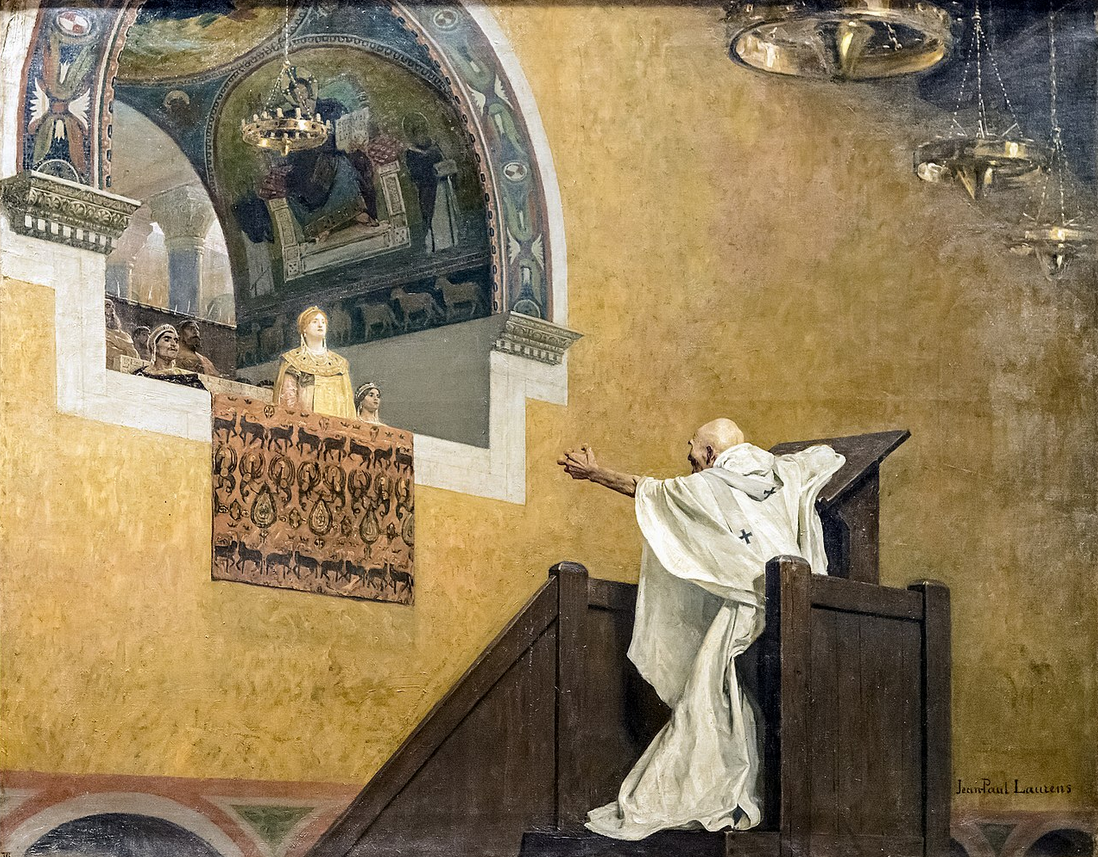
But the people of Constantinople would not let him go. They drove away his enemies from the city; they raised a sedition and a seasonable earthquake, as Gibbon might call it, and having excited superstitious fears, the empress caused him to be recalled. His return, of course, was a triumph. The people spread their garments in his way, and conducted him in pomp to his archiepiscopal throne. Sixty bishops assembled and annulled the sentence of the Council of the Oaks. He was now more popular and powerful than before. But not more prudent. For a silver statue of the empress having been erected so near to the cathedral that the games instituted to its honor disturbed the services of the church, the bishop in great indignation ascended the pulpit, and declaimed against female vices. The empress at this was furious, and threatened another council. Chrysostom, still undaunted, then delivered that celebrated sermon, commencing thus: “Again Herodias raves; again she dances; again she demands the head of John in a basin.” This defiance, which was regarded as an insult, closed the career of Chrysostom in the capital of the Empire. Both the emperor and empress determined to silence him. A new council was convened, and the Patriarch was accused of violating the canons of the Church. It seems he ventured to preach before he was formally restored, and for this technical offence he was again deposed. No second earthquake or popular sedition saved him. He had sailed too long against the stream. What genius and what fame can protect a man who mocks or defies the powers that be, whether kings or people? If Socrates could not be endured at Athens, if Cicero was banished from Rome, how could this unarmed priest expect immunity from the possessors of absolute power whom he had offended? It is the fate of prophets to be stoned. The bold expounders of unpalatable truth ever have been martyrs, in some form or other.
But Chrysostom met his fate with fortitude, and the only favor which he asked was to reside in Cyzicus, near Nicomedia. This was refused, and the place of his exile was fixed at Cucusus,–a remote and desolate city amid the ridges of Mount Taurus; a distance of seventy days’ journey, which he was compelled to make in the heat of summer.
But he lived to reach this dreary resting-place, and immediately devoted himself to the charms of literary composition and letters to his friends. No murmurs escaped him. He did not languish, as Cicero did in his exile, or even like Thiers in Switzerland. Banishment was not dreaded by a man who disdained the luxuries of a great capital, and who was not ambitious of power and rank. Retirement he had sought, even in his youth, and it was no martyrdom to him so long as he could study, meditate, and write.
So Chrysostom was serene, even cheerful, amid the blasts of a cold and cheerless climate. It was there he wrote those noble and interesting letters, of which two hundred and forty still remain. Indeed, his influence seemed to increase with his absence from the capital; and this his enemies beheld with the rage which Napoleon felt for Madame de Staël when he had banished her to within forty leagues of Paris. So a fresh order from the Government doomed him to a still more dreary solitude, on the utmost confines of the Roman Empire, on the coast of the Euxine, even the desert of Pityus. But his feeble body could not sustain the fatigues of this second journey. He was worn out with disease, labors, and austerities; and he died at Comono, in Pontus,–near the place where Henry Martin died,–in the sixtieth year of his age, a martyr, like greater men than he.
Nevertheless this martyrdom, and at the hands of a Christian emperor, filled the world with grief. It was only equalled in intensity by the martyrdom of Becket in after ages. The voice of envy was at last hushed; one of the greatest lights of the Church was extinguished forever. Another generation, however, transported his remains to the banks of the Bosporus, and the emperor–the second Theodosius–himself advanced to receive them as far as Chalcedon, and devoutly kneeling before his coffin, even as Henry II. kneeled at the shrine of Becket, invoked the forgiveness of the departed saint for the injustice and injuries he had received. His bones were interred with extraordinary pomp in the tomb of the apostles, and were afterwards removed to Rome, and deposited, still later, beneath a marble mausoleum in a chapel of Saint Peter, where they still remain.
Such were the life and death of the greatest pulpit orator of Christian antiquity. And how can I describe his influence? His sermons, indeed, remain; but since we have given up the Fathers to the Catholics, as if they had a better right to them than we, their writings are not so well known as they ought to be,–as they will be, when we become broader in our views and more modest of our own attainments. Few of the Protestant divines, whom we so justly honor, surpassed Chrysostom in the soundness of his theology, and in the learning with which he adorned his sermons. Certainly no one of them has equalled him in his fervid, impassioned, and classic eloquence. He belongs to the Church universal. The great divines of the seventeenth century made him the subject of their admiring study. In the Middle Ages he was one of the great lights of the reviving schools. Jeremy Taylor, not less than Bossuet, acknowledged his matchless services. One of his prayers has entered into the beautiful liturgy of Cranmer. He was a Bernard, a Bourdaloue, and a Whitefield combined, speaking in the language of Pericles, and on themes which Paganism never comprehended and the Middle Ages but imperfectly discussed.
The permanent influence of such a man can only be measured by the dignity and power of the pulpit itself in all countries and in all ages. So far as pulpit eloquence is an art, its greatest master still speaketh. But greater than his art was the truth which he unfolded and adorned. It is not because he held the most cultivated audiences of his age spell-bound by his eloquence, but because he did not fear to deliver his message, and because he magnified his office, and preached to emperors and princes as if they were ordinary men, and regarded himself as the bearer of most momentous truth, and soared beyond human praises, and forgot himself in his cause, and that cause the salvation of souls,–it is for these things that I most honor him, and believe that his name will be held more and more in reverence, as Christianity becomes more and more the mighty power of the world.
(Go back to Part 1)
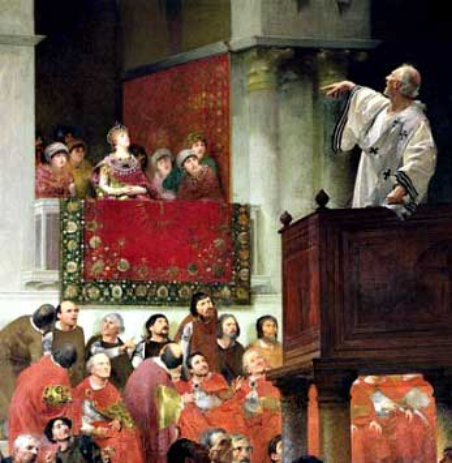
John Chrysostom (Part 2)
Latest from Culture
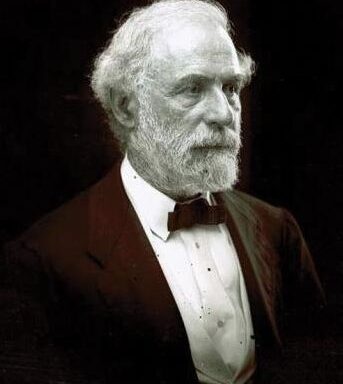
A Memory of Robert E. Lee
"Everyone obeyed him, not because they feared but because they loved him."

The Venerable Bede
"Arising from the gloom of a dark age, he is still considered one of the most illustrious of the learned men of England."
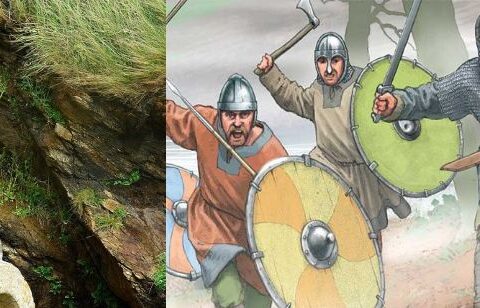
Gildas
The underrated chronicler who paints "fully and vividly the thought and feeling of Britain in the fifty years of peace which preceded her final overthrow."

Movie Review: The Thing (1982)
A brilliant horror movie that blends the right amount of suspense, schlock, body horror, and practical effects to create a classic.

Friday Music: September 87 – Room Service
Editor’s note: See the previous chapters at these links: Bad Dream Baby and Light Years.



